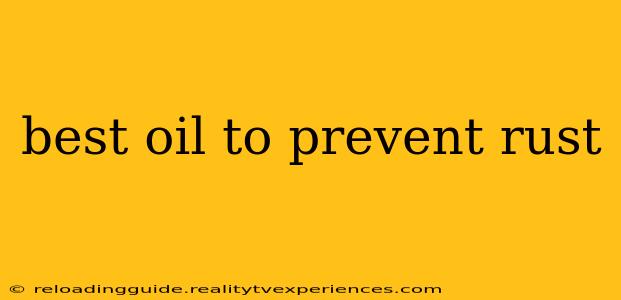Rust. That orange scourge of metal, the bane of car owners, boat enthusiasts, and tool collectors everywhere. Preventing rust is crucial for preserving valuable possessions and ensuring the longevity of essential equipment. But with countless oils on the market, choosing the best oil for rust prevention can feel overwhelming. This comprehensive guide will cut through the confusion, exploring different types of oils and their effectiveness in combating rust.
Understanding Rust and its Prevention
Before diving into specific oils, let's understand the enemy. Rust, or iron oxide, forms when iron or steel reacts with oxygen in the presence of water or moisture. The key to prevention lies in creating a barrier that prevents this reaction. Oils offer this barrier by coating the metal surface, repelling moisture and oxygen.
Types of Oils for Rust Prevention
Several types of oils excel at preventing rust. Each has its strengths and weaknesses, making the "best" oil dependent on your specific needs and application.
1. Mineral Oil
- Pros: Widely available, inexpensive, relatively safe, and offers decent rust protection in low-humidity environments.
- Cons: Provides less robust protection than other oils, especially in harsh conditions or prolonged exposure to moisture. Can attract dust and dirt, potentially compromising its protective barrier. Not suitable for food-grade applications.
2. Petroleum-Based Oils (e.g., WD-40)
- Pros: Excellent for displacing water and providing temporary rust protection. Useful for quick touch-ups and light-duty applications.
- Cons: Not designed for long-term rust prevention. The protective layer evaporates relatively quickly, requiring frequent reapplication. Not ideal for prolonged exposure to moisture or harsh weather conditions.
3. Synthetic Oils
- Pros: Superior rust protection compared to mineral or petroleum-based oils. Offer excellent water resistance and long-lasting protection. Often formulated with additives to enhance performance.
- Cons: More expensive than mineral oils. The specific formulation matters greatly; some synthetic oils are better suited for certain applications than others.
4. Boiled Linseed Oil
- Pros: Penetrates deeply into the metal, providing a strong protective layer. Forms a hard, durable finish over time. Environmentally friendly and suitable for many applications.
- Cons: Requires longer drying time than other oils. Can be messy to apply and requires careful ventilation due to its strong odor.
5. Corrosion Inhibitors (e.g., Cosmoline)
- Pros: Specifically formulated to prevent corrosion and rust. Offers excellent long-term protection, even in extreme conditions.
- Cons: Can be difficult to remove once applied. Often require specialized cleaning agents. May have a strong odor.
Choosing the Right Oil for the Job
The best oil for preventing rust depends on several factors:
- Environment: For outdoor applications exposed to harsh weather, synthetic oils or corrosion inhibitors are preferred. For indoor storage, mineral oil might suffice.
- Application: For tools and machinery, a heavier oil might be beneficial. For delicate mechanisms, a thinner oil is preferable.
- Budget: Mineral oils are the most budget-friendly, while synthetic oils and corrosion inhibitors are more expensive.
- Frequency of Application: If frequent reapplication is feasible, petroleum-based oils can work effectively. For long-term protection, invest in higher-quality oils.
Beyond Oil: Additional Rust Prevention Techniques
While oils are crucial, remember that they're often most effective when combined with other rust prevention strategies:
- Proper Cleaning: Remove dirt, debris, and existing rust before applying any oil.
- Regular Inspection: Check for rust regularly and address any issues promptly.
- Storage: Store metal items in a dry, well-ventilated area.
- Protective Coatings: Consider applying a protective coating such as paint or wax in conjunction with oil.
By understanding the different types of oils available and employing a comprehensive rust prevention strategy, you can significantly extend the lifespan of your valuable metal possessions. Remember to always consult the manufacturer's instructions for specific recommendations on oil usage and safety precautions.

